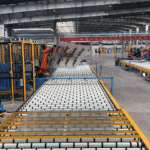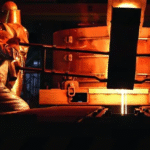Glass Industry
High-quality glass starts with high-quality ingredients. In flat and specialty glass manufacturing, Soda Ash Dense serves as a vital flux, dramatically reducing melting energy and costs. Anhydrous Sodium Sulfate further refines the melt, delivering the clarity, homogeneity, and defect-free quality demanded by modern applications.
RELATED PRODUCTS
Soda Ash Dense
Large particles, high density, good flowability when mixed with quartz sand, limestone, etc., stable melting reaction, can reduce bubbles in glass, and improve glass flatness.

Specific Scenario
As a key flux in glass production, soda ash dense lowers melting temperatures, improves energy efficiency, and ensures high clarity and consistency for diverse applications.
Related Value
Ideal for large-scale continuous production processes—such as thousand-ton-per-day glass lines—it minimizes raw material loss through high chemical consistency and controlled reactivity. This leads to more stable melting, improved batch uniformity, and ultimately higher glass yield, supporting cost-efficient and sustainable manufacturing.

Specific Scenario
Widely employed as a high-efficiency refining agent in optical and microcrystalline glass production. It effectively removes micro-bubbles, enhances melt homogeneity, and improves overall product quality and performance.
Product Function
It effectively reduces the melting temperature of glass batches by approximately 50–100°C, significantly cutting energy consumption during production. Additionally, it suppresses undesirable crystallization and enhances glass transparency, resulting in higher product quality and more stable manufacturing processes.
Sodium Sulphate Anhydrous
White crystalline solid, highly soluble in water and hygroscopic. It has a melting point of 884°C and a relative density of approximately 2.68.
FAQ
Clarifier: Improve the transparency and uniformity of glass
Flux: Reduce the melting temperature and viscosity of the mixture, allowing refractory materials such as silica sand to melt faster and more evenly, thereby improving the production efficiency and energy-saving effect of the melting furnace
It is essential to maintain reducing conditions in the batch. The decomposition temperature of sodium sulfate is very high (above 1200°C). Therefore, it is used in conjunction with a reducing agent, typically carbon (e.g., coke or anthracite coal). The reductant lowers the decomposition temperature, allowing the fining reaction to occur at a more optimal and efficient stage in the melting process.
Other forms, like Glauber’s Salt (Na₂SO₄·10H₂O), contain significant amounts of water of crystallization. In the furnace, this water must be evaporated, consuming large amounts of energy and potentially causing batch agglomeration or popping, which leads to unstable production and higher energy costs. Anhydrous Sodium Sulfate is more pure, stable, and ensures accurate batching and consistent melting.
Reduce fly and delamination: Soda Ash Dense particles are large, dense, and have moderate flowability, making them less likely to fly during the transportation, mixing, and feeding processes of the mixture. Soda Ash Light particles are small, have low density, and have good fluidity, which can easily generate a large amount of dust (fly material) during transportation (especially pneumatic transportation) and feeding, causing raw material loss, environmental pollution, health hazards, and leading to the separation of light and heavy components in the mix, seriously affecting the uniformity of glass composition.
Improve mixing uniformity: The particle size distribution of Soda Ash Dense is more easily matched with other raw materials, resulting in a more uniform mixing and less likely to segregate.
Yes, this is very common. Their functions are complementary: Soda Ash Dense acts as the main flux, while Anhydrous Sodium Sulfate acts as a secondary flux and the primary fining agent. The ratio between them must be scientifically designed based on the glass type, furnace melting characteristics, and desired fining results.
Yes. We are committed to sustainable manufacturing processes, minimizing energy consumption and emissions. Furthermore, our products enable the glass industry to reduce its melting temperatures, leading to lower energy consumption and a reduced carbon footprint, making them a key component in the green glass manufacturing supply chain.
Have a specific technical question? Contact our experts today for a consultation.
